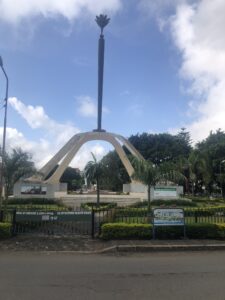
Photo: Arusha Declaration Monument (own picture)
Author: Freda Louwes
Each city has its own character. It is individual in its structure and position. Basic functions of one city may be applied to another, nevertheless, no two cities are the same. We differentiate several types of cities ranging from industrial cities, market cities, university cities over cities of culture to political cities. With growing urbanization and the development of megacities, geographers have faced the problem of one city fitting more than one type. The perception of cities has become a conceptual issue (Calder 2021). Consequently, a new term had to be found that best described the importance of cities without reducing them to only one characteristic. Saskia Sassen introduced the concept of the global city, a concept that realizes the multipurpose of cities and acknowledges the relational importance of them in a global economic and political arena (Sassen 2001: 169).
Political Cities are characterized by their political influence. Oftentimes major political cities are the equivalent to capital cities, however, in the case of Arusha another explanation can be found. Political influence cannot be reduced to the mere residence of national governments, rather it is extended by regional and global headquarters of international organizations. In Tanzania, the hub for regional integration and international cooperation is Arusha.
Read more: Political City
